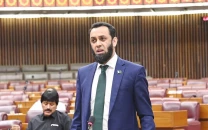‘What are the minimum needs of quality education?’
Govt’s laptop scheme comes under fire on final day of regional seminar.

“For a deliverable education system, the purpose of imparting education has to be defined and the outcomes established,” said Pervez Hoodbhoy, on Thursday, speaking at the second and final day of the regional seminar, Quality Inequality Quandary.
Hoodbhoy, who teaches at Lahore University of Management and Sciences (LUMS) and the Quaid-i-Azam University (QAU), said the manner in which knowledge was transmitted had changed over the decades. He said the modern educational system allowed for “internalization” of knowledge, which he said was continuously being generated, as opposed to the older educational system in which “memorizing” was of the essence. Hoodbhoy termed the examination system ‘rotten’ as it had reinforced to students that examinations were all about memorizing information, other than understanding it.
He said the 2011 Annual Status on Education Report was ‘deeply depressing’. The report, he said, failed to include madrassas, adding that had they been included it would have reflected how their teaching practices had not changed or evolved at all.
He criticised textbooks in general for their ‘dullness’ and their failure to excite children to learn. He said the syllabus itself was ‘not so bad’. “Those are not the types of books that should be allowed to be taught.”
“At QAU I teach students Physics in Urdu while at LUMS I teach the same subject in English,” said Hoodbhoy, adding that subjects should be taught in the language which they could be understood. He wondered “how much good those 125,000 laptops will do,” referring to the Punjab government’s laptop scheme. Hoodbhoy said the nation should only strive for an “education revolution.”
StepUP Pakistan founder Ali Moeen Nawazish said the latest technology had not been incorporated in the educational system. “Education has been stigmatised by the word boring,” said Nawazish, who set a world record in 2009 for the highest number of A grades in the A-level exams, earning 22 A’s out of 23 exams. Nawazish said the education system could be vastly improved with the use of technology.
Nawazish urged the Punjab government to better utilise the laptop scheme. “The 125,000 laptops is a good step but more can be done to enhance the learning skills of a student.” Nawazish said the task of improving the educational system can be accomplished “but change does not come overnight.”
“Private schools are accused of creating a class divide in the educational system,” said the Beaconhouse School system CEO Kasim Kasuri. Rejecting the notion of a standardised curriculum, Kasuri said there was confusion between standardisation of curricula and quality. He said even in the private sector, schools operated at different levels. “There is a need to define the minimum requirements of a standard education.”
Kasuri said as the education system had not evolved as it should have, the curricula had also failed to evolve. “Teachers are still teaching the same lesson plan.” He said exam-based learning was the biggest flaw in the educational system.
Kasuri said schools were not relying on real life skills. He said teacher training only improved “professional practices,” and that it failed to improve the learning outcomes of a child unless it was coupled with school-based monitoring.
Schools Additional Secretary Mukhtar Noul said the government was working to facilitate teaching of science at an early stage in schools. Noul said the private sector had done a lot to bridge the gap in the educational system. He said that despite being better qualified and better paid than teachers at most private schools, government teaches performed worse. Noul said he hoped that in the next few years the educational system would be in a much better shape.
MNA Ahsan Iqbal said a majority of the public understood the necessity of quality education. “The ruling elite’s insensitivity towards education is where the problem lies.” He said the fundamental issue was the ‘outdated’ educational system under which students were being taught. Iqbal said quality standards should be established in accordance with global requirements. “Why can’t a student have the right to a quality teacher?”
The two-day seminar, which kicked off with students asking participants to sign a petition urging the government to take immediate steps to implement Article 25-A, ended with a resolve for better regional co-operation towards quality education. Singapore, Afghanistan, China, India and UAE also participated in the regional seminar.
Speaking with The Express Tribune ITA Right to Education Campaign programme manager Ayesha Bilal said that a campaign for one million signatures was launched in March under the ITA. “The aim is to create awareness regarding a child’s right to free education.”
ITA programme director Baela Raza Jamil said so far 270,000 signatures had been collected. The campaign will end on April 19, marking the second anniversary of the enactment of Article 25-A.
The seminar was organised by the South Asian Forum for Education Development (SAFED), Idarae Taleem-o-Aagahi (ITA) in collaboration with Education Testing Service (ETS) in a local hotel.
Published in The Express Tribune, April 6th, 2012.



















COMMENTS
Comments are moderated and generally will be posted if they are on-topic and not abusive.
For more information, please see our Comments FAQ